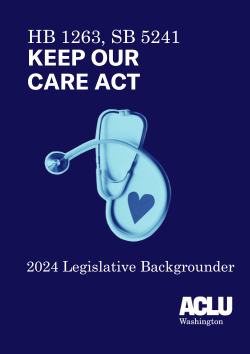SUPPORT SB 5241/HB 1263
Consolidations between health care entities like hospitals, hospital systems, provider organizations and others are prolific in Washington State and can negatively impact cost, quality, and access to necessary health care services. Yet in Washington, these health entity consolidations receive minimal oversight, allowing large health care systems to dictate patients’ access to care.
Support the Keep Our Care Act, SB 5241/HB 1263 to safeguard community access to quality affordable care.
WHAT WOULD THE KEEP OUR CARE ACT DO?
The Keep Our Care Act would ensure consolidations and contracting affiliations improve rather than harm access to affordable quality care within a community. The bill:
- Prohibits health entity consolidations that diminish access to affordable quality care;
- Requires Attorney General oversight and enforcement to ensure health entity consolidations do not negatively impact access to health care services;
- Includes a health equity assessment so that health entity consolidations address the needs of marginalized communities;
- Ensures community input through public notification of proposed consolidations and the opportunity for public hearings and comment.
WHY IS THE KEEP OUR CARE ACT NEEDED?
Consolidations drive up costs for patients. Decades of research shows that health entity consolidations are at the root of rising health care costs, commonly resulting in price increases of up to
20% or more. When large health systems buy up their competitors, they gain the ability to set prices without regard for the impact on patients, employers, and our state budget. Washington has first-hand experience: In 2017, Washington’s
Attorney General sued CHI Franciscan for consolidations that they asserted resulted in raised prices, increased wait times, and reduced services and locations. The cost of health care continues to rise in our state, as do racial disparities, with Black and Latinx Washingtonians
more likely to forgo health care due to cost, then the white population.
Consolidations do not improve the quality of care. Studies have found that consolidated hospitals are more likely than independent hospitals
to eliminate critical services like maternity wards and surgical care, and that hospital acquisitions are associated with worse patient experiences.
A recent study of Medicare patients found that consolidations between physicians and hospitals resulted in a significant increase in post-procedure complications.
Washington has seen consolidations restrict access to critical health care services —including reproductive and end-of-life care. This results in medically unnecessary hurdles, harmful delays, and increased travel time. These barriers and restrictions are discriminatory and unsafe.
- After Virginia Mason consolidated with CHI Franciscan, restrictions were placed on the provision of medical aid in dying and on abortion care.
- After Harrison Medical Center in Bremerton consolidated with Franciscan Health System, doctors at Harrison were no longer allowed to prescribe medication to assist with medical aid in dying and the health system restricted the provision of abortion care.
- After Swedish Health Services, based in King County, consolidated with Providence Health & Services, Swedish restricted the provision of abortion care.
Oversight is needed to hold big health systems accountable. Large health systems in our state are sitting on billions of dollars in cash reserves and investments and receive our tax-payer money but face little accountability to the communities they serve. While they gobble up clinics and hospitals, workers and patients are burdened by the consequences.
A New York Times investigation found that one of our state’s largest systems, Providence Health & Services, is sitting on nearly $12 billion in cash while receiving annually over $1 billion in tax breaks, and paying its CEO $10 million annually.
Uninsured and underinsured individuals are disproportionately harmed when health systems do not prioritize community needs. In recent years the Attorney General has found that three of Washington’s largest health systems, CHI Franciscan,
Providence, and
PeaceHealth, have prevented low income patients from accessing charity care. In the
Attorney General’s lawsuit against CHI Franciscan former employees reported that they were told to “never volunteer information about St. Joseph’s charity care program to patients, even if they were obviously low income or homeless.” The lawsuit against Providence hospitals is ongoing.
Consolidations can exacerbate systemic inequities. Profound racial and ethnic health disparities exist in Washington state with Black and Alaska Indians and Alaska Native
people having worse health outcomes and less access to care than white people, and the rate of pregnancy-associated death being
2.5 times higher for Black and Native Hawaiian and Pacific Islanders than white people. Research shows that consolidations contribute to disparities. Lack of market competition, combined with private health systems’ efforts to increase revenues by attracting more patients with private insurance,
has been found to lead to worsening health care access and outcomes for Medicaid patients - who are disproportionately People of Color. In Washington state, about 30 percent of the population identifies as non-white, but over 37 percent of Apple Health patients are people of color.
Rural communities deserve better. High costs, limited services and lack of alternative care sites can create insurmountable barriers to care in rural communities.
A recent study found that, “[F]ollowing health system affiliation, rural hospitals experienced a significant reduction in on-site diagnostic imaging technologies, the availability of obstetric and primary care services, and outpatient non-emergency visits, as well as significant increase in operating margins.”

